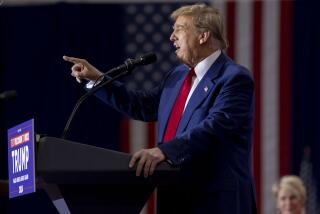North Lawyer Rejects Pact, Says It ‘Guts the Defense’ : Would Be ‘a Mockery of Process’
- Share via
WASHINGTON — Lawyers for Oliver L. North said in a court filing released today that they would be unable to defend him adequately under a proposed agreement to control the use of classified material North wants to use in his defense.
The proposed agreement “would gut the defense and guarantee a ‘cuckoo-clock’ trial that would make a mockery of the adversarial process,” said North’s lawyer, Brendan Sullivan. He said that, without the information he wants to present, “we cannot adequately defend this case.”
The agreement was worked out between the office of independent counsel Lawrence B. Walsh, who is prosecuting North, and the Justice Department, which fears that North will spill classified material damaging to national security at his trial.
The proposed order would “gut the defense” by barring North from using “critical information about the Reagan Administration’s third-country arrangements for military support of the (Nicaraguan) Resistance and the official non-disclosure of those arrangements,” the filing by Sullivan said.
In referring to a “cuckoo-clock” trial, Sullivan was quoting the judge in the Iran-Contra case, U.S. District Judge Gerhard A. Gesell. Gesell has made it clear that the government’s proposed order would have nine categories of classified information that should not be revealed at trial before prosecutors have had an opportunity to contest its relevance.
They include information identifying undercover CIA officers, the locations of CIA stations, identities of foreign individuals who work for the CIA and details about CIA operations with foreign intelligence services.
Also included would be material about American intelligence collection on terrorism and efforts to locate hostages; U.S. covert activities other than military support for the Contras, and names of non-Central American countries that supported the Contras.
Part of the proposed agreement would bar North from offering evidence about Central American countries’ support for the Contras in exchange for favors from the Reagan Administration. Under the agreement, “a candid admission” by the government of a quid pro quo arrangement would be sufficient.
Unless Gesell approves the agreement, Walsh and the Justice Department agree that “it will be impossible . . . to protect against disclosure of classified information that is of vital importance to the national security and the foreign relations of the United States.
“The trial could not go forward in this state of uncertainty,” Walsh said in a motion that outlined the government’s proposed order.
Sullivan said a quid pro quo admission “fails to acknowledge that President Reagan and other top Administration officials established a policy that the arrangements would not be disclosed outside the Executive Branch.” If imposed by the court, Sullivan said, that part of the agreement “would cripple the defense of this case.”
Referring to the nine areas of material on which the proposal would impose tight controls, Sullivan said that “these open-ended, amorphous categories would guarantee that the trial would be a constant bench conference, not a real trial.”
More to Read
Sign up for Essential California
The most important California stories and recommendations in your inbox every morning.
You may occasionally receive promotional content from the Los Angeles Times.













